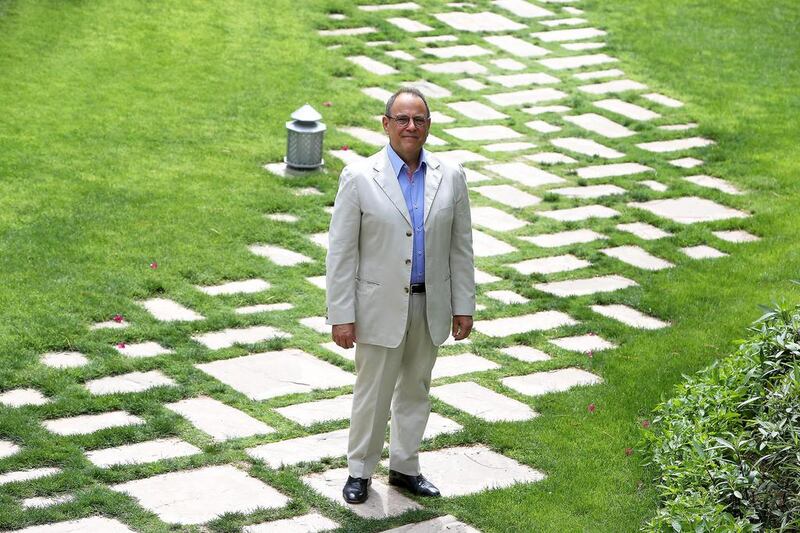What do Donald Trump, Sir Richard Branson, Bill Clinton and Bill Gates all have in common, apart from being at the wealthier end of the spectrum? All are Feng Shui followers.
Feng Shui literally translates from Chinese as “wind” (feng) and water (“shui”), and is essentially a tradition of holistic design principles. Some dismiss it as an old Chinese myth or a fad for kooky new agers, but advocates say it can improve everything from harmony in the home to wealth and well-being. And far from being a fad, it’s been around for at least the last millennia.
The man who is credited by many with having brought Feng Shui from the East to the West is coming to Dubai this month. Twenty years ago, the American William Spear wrote one of the first books with the words "Feng Shui" in the title, Feng Shui Made Easy. Since then it has been translated into 14 languages, and was hailed by The New York Times as "the most user-friendly explanation of Feng Shui for American audiences". There are now about 1,400 books available on the subject.
Mr Spear says these days Feng Shui is as popular as when his book first gained popularity, but in a more superficial way. “There are many practitioners all over the place, so it’s popular in that sense. But now there’s Feng Shui bath soaps, and Feng Shui haircuts – those things are hardly serious applications of Feng Shui.”
Mr Spear’s clients include Kinnarp, the Swedish furniture manufacturer. After his book came out, Mr Spear was invited to its HQ in Sweden to run a three-day workshop for designers. As a result they designed a line of furniture using Feng Shui, and now incorporate its principles throughout the company.
He has also worked on branches of Body Shop in the UK. “The Body Shop certainly has Feng Shui in its DNA. Behind all their shelving are mirrors, so it looks like there’s a depth of product. The illusion expands the store considerably.”
And the advocate has also worked with Nando’s. “The owners of Nando’s understand the flow of energy to make the experience more enjoyable for their customers,” he adds.
For companies, like Nando’s and Ritz-Carlton – where Mr Spear assesses branches across the globe – the colours and styles he chooses depend on the location.
“The climate matters. If you’re in a very hot country like India, it would be very different than if you’re in Scandinavia,” he says. “You wouldn’t use the same kind of materials or fixtures and similarly you choose colours differently.
“There’s a whole psychology of the impact of colour on any environment. So if you choose reds, it’s going to stimulate – a red used in a restaurant tends to make you eat faster. Make no mistake - when McDonald’s chose red and yellow, they knew something about the psychology of colour. Grey or neutral colours do the opposite.”
So what’s Mr Spear’s No 1 tip for companies that cannot afford to refurbish?
“Clear the clutter. Fill some big plastic trash bags with the stuff you don’t need and give it away. The more space you create in a space, the more likely things will come in,” says Mr Spear who is currently in Dubai and is taking consultations until Sunday.
“Many successful stores have minimal amounts of goods. High-end clothing stores will have six or eight shirts on a rack, not 70 crammed in.
“In offices, try to have your desk face the door so that you can see who enters, providing you with a full view of the room at all times. If your back is to the entrance, you will feel an unconscious uneasiness that drains your energy. And avoid placing pictures and art on the wall above or behind your head – it can distract the attention of your visitors.”
Lighting is important too.
“Research shows people are more motivated and healthier when seated near windows and natural light, or using full-spectrum bulbs. Desk or standing lamps are better alternatives to lights suspended overhead, which add a sense of burden and unease to the worker below. For the same reason, it is best not to sit under high shelving so as not to feel that things are getting on top of you.”
And what about greenery in the workspace?
“Live plants bring in fresh, vital energy and are particularly effective in countering the negative electromagnetic fields of office equipment. Plants should have rounded, not pointed leaves. Cacti might serve a purpose in the desert but not in a working environment.”
But do Mr Spear’s clients always heed his advice?
“Oh heavens, no. No more than any patient does when they go to a doctor. Which is good news, because I’m not always right.”
William Spear will be hosting a free workshop tomorrow from 2-5pm at Urban Tribe, Al Qoz Industrial Area 4 in Dubai
business@thenational.ae
Follow us on Twitter @Ind_Insights





